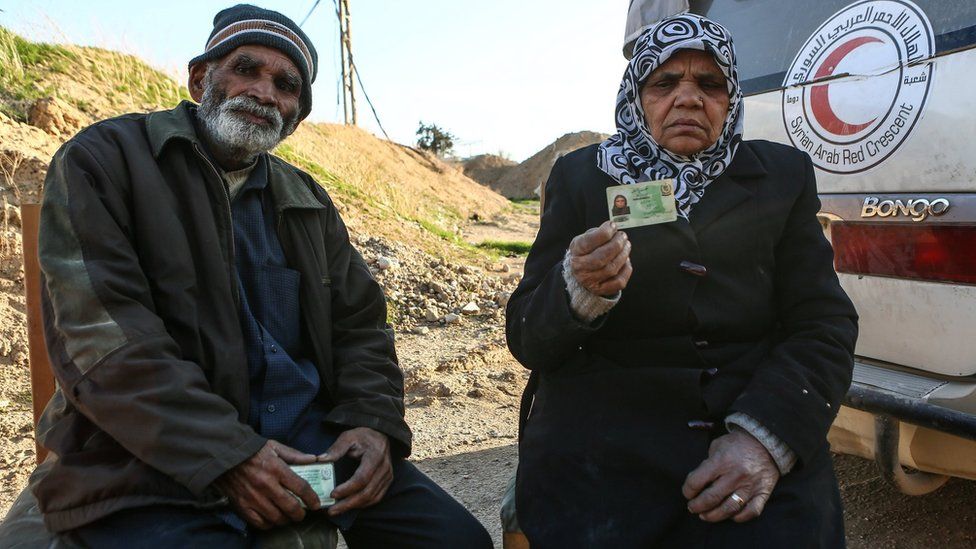Syria war: Pakistani civilians leave besieged Eastern Ghouta
- Published

An elderly Pakistani couple have been evacuated from the besieged rebel-held Eastern Ghouta area in Syria during one of the daily "humanitarian pauses".
The Syrian Arab Red Crescent helped the man and his wife leave on Wednesday.
On Thursday, the government and its ally Russia accused rebel fighters of continuing to shell a "corridor" meant to allow civilians to be evacuated.
Rescuers meanwhile reported that six civilians, including a girl, were killed in fresh government air strikes.
Medics say more than 580 people have been killed in the Eastern Ghouta since the government and its allies intensified their bombardment on 18 February.
The 393,000 civilians trapped in the enclave, the last major rebel stronghold near the capital Damascus, also face severe shortages of food and medical supplies.
The Syrian Arab Red Crescent said on Twitter on Thursday that the Pakistani couple had been evacuated and "delivered to the Pakistani embassy in Syria in co-operation with all concerned parties".
The AFP news agency named them as Mohammad Fadhl Akram, 73, and Saghran Bibi, and quoted Mr Akram as saying that they had had to leave their two sons, three daughters and 12 grandchildren behind in the town of Douma.
"I hope God protects them," he added. "I don't want anything else."
On Wednesday night, a pro-opposition news agency reported that the couple had been assisted by members of Jaysh al-Islam, the dominant rebel group in the enclave, and posted photos of them holding up Pakistani identification cards.
The Syrian Observatory for Human Rights, a UK-based monitoring group, said Mr Akram and his wife were the first people to leave the Eastern Ghouta since Russia ordered daily pauses in bombardment from 09:00 until 14:00 (07:00-12:00 GMT).
But it added that their evacuation was the result of months of negotiations by the Pakistani embassy and not the Russian initiative.
"At least in heaven there's food": The children caught up in Eastern Ghouta air strikes
The Russian military has said rebels are preventing civilians being evacuated by shelling a "humanitarian corridor" leading to the al-Wafideen checkpoint.
On Thursday, spokesman Maj-Gen Vladimir Zolotukhin told reporters that residents had made numerous requests to be evacuated over the previous 24 hours.
The rebels have denied they are trying to stop civilians leave and accused Russia of failing to stop air and artillery strikes during the designated pauses.
The Syria Civil Defence, whose rescue workers are widely known as the White Helmets, said air strikes had targeted the towns of Hamouria, Kafr Batna and Otaya on Thursday, killing six people.
The Syrian state news agency, Sana, meanwhile reported that a civilian was injured by rebel mortar fire in the Bab al-Salam area of Damascus' Old City.
The UN wants Russia and other powers involved in the Syrian conflict to implement a Security Council resolution adopted on Saturday that demands a nationwide cessation of hostilities "without delay" for at least 30 days to enable humanitarian aid deliveries and medical evacuations.
"We will continue asking until we are red in the face, blue in the face, for both sides... to stop shelling each other's areas and for convoys to be allowed to get to Eastern Ghouta in particular," UN special envoy Staffan de Mistura told a news conference in Geneva on Thursday.
His adviser, Jan Egeland, said he had delivered an "unusually blunt" message to the 23 countries on the UN's humanitarian task force for Syria: "You are failing to help us help civilians in Syria."
He described the situation in the Eastern Ghouta as "devoid of respect for international law", with 14 hospitals, three health centres and two ambulances attacked between 18 and 22 February, and a "constant barrage of rockets and mortars" fired into government-held Damascus.
But Mr Egeland also expressed hope that the UN would soon get a permit to deliver aid to Douma, which he said had not happened for a very long time.
He also noted that the International Committee of the Red Cross had just managed to send a convoy carrying aid for 50,000 people into the northern Kurdish enclave of Afrin, which is the target of a major military offensive by the Turkish military and allied Syrian rebel factions.
- Published26 February 2018
- Published24 February 2018
- Published22 February 2018